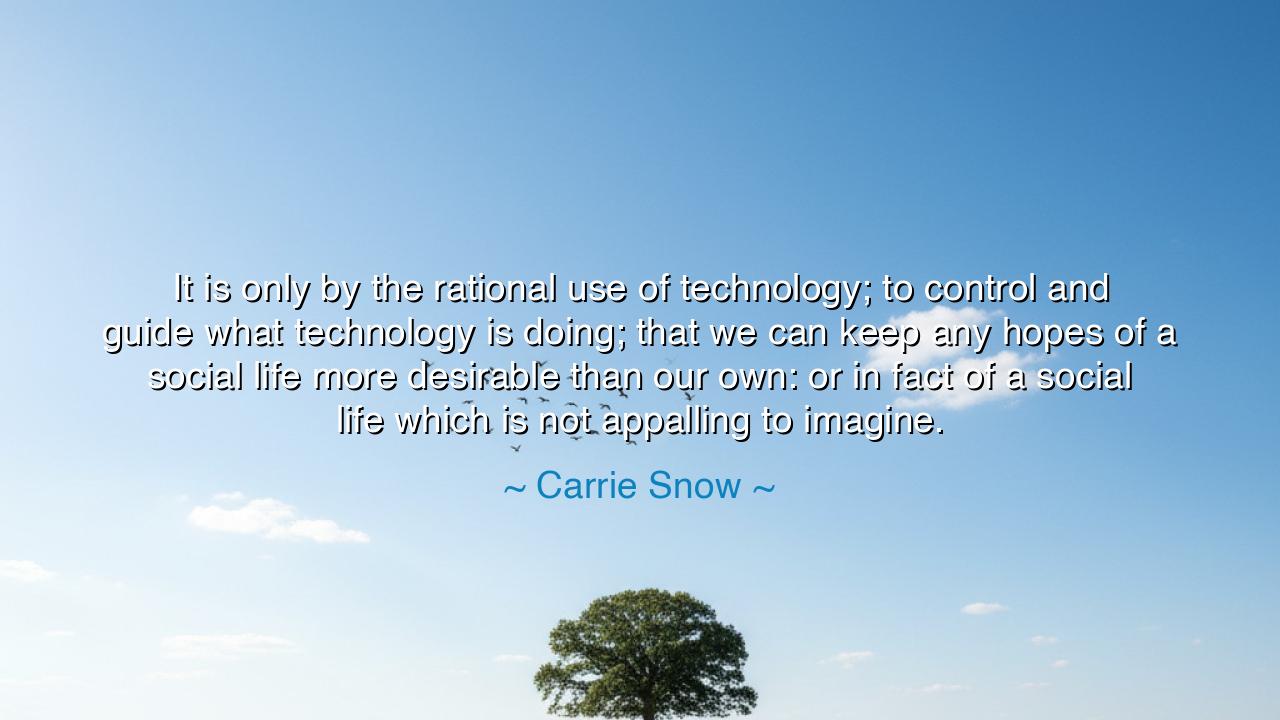
It is only by the rational use of technology; to control and
It is only by the rational use of technology; to control and guide what technology is doing; that we can keep any hopes of a social life more desirable than our own: or in fact of a social life which is not appalling to imagine.






Hearken, children of the future, to the words of Carrie Snow, who proclaimed: “It is only by the rational use of technology; to control and guide what technology is doing; that we can keep any hopes of a social life more desirable than our own: or in fact of a social life which is not appalling to imagine.” This utterance is no passing thought, but a solemn warning and a timeless counsel. For she speaks of the double-edged nature of invention—the flame that can warm or consume, the sword that can defend or enslave. Snow reminds us that mankind’s creations, if left untended, may become the very architects of our despair.
The ancients knew well the danger of gifts without restraint. Recall the tale of Prometheus, who stole fire from the gods and gave it to men. Fire, like technology, was a power beyond measure. In the hands of the wise, it gave warmth, light, and life. But in the hands of the reckless, it burned homes, devoured forests, and destroyed lives. Thus even in myth, the lesson was spoken: power is never evil nor good by its nature—it is the human heart that must guide it. So too today, the glowing screens and endless machines that surround us must be wielded with wisdom, lest they scorch the soul of society.
Snow warns us of the collapse of social life if we do not steer the forces we have unleashed. For what is society, if not the weaving together of voices, of hands, of shared dreams? And yet, already in our day, many sit silent at feasts, their eyes fixed not upon one another but upon the cold shine of glass devices. Friends walk side by side, but dwell in separate worlds, their hearts distracted, their presence fractured. If we do not awaken, we may birth a future where men and women live not in communion, but in isolation—alone together, strangers at their own hearths.
Consider the lesson of the Industrial Revolution. Factories rose like iron mountains, and with them came both prosperity and peril. The loom and the engine gave wealth, yet they also chained children to ceaseless labor, blackened the skies with smoke, and drew millions into cities where life became harsher than before. Only when voices rose to control and guide this power—through laws, reforms, and moral courage—did society reclaim balance. The machines themselves were not wicked, but without reason and restraint, they made life indeed “appalling to imagine.”
The heart of Snow’s teaching is clear: technology must serve humanity, not humanity serve technology. To be rational is to ask not only “what can this machine do?” but “what should it do?” To be rational is to see not only profit or novelty, but the deeper question: does this invention heal the human spirit, or does it hollow it? Without such discernment, we risk forging a world where progress is measured in wires and engines, but life itself grows barren.
Let us, then, hold to this lesson in our daily walk. Before you reach for the device, ask if it connects you or divides you. Before you trust the machine, ask if it strengthens your humanity or diminishes it. When new powers emerge—as they always shall—do not be swept away by their glitter, but stand as their master, their guardian, their guide. In this way, we may yet carve out a future where social life is not a husk of what it once was, but something greater, nobler, more radiant.
Therefore, O seeker, take this wisdom into your heart: let rational use be your compass, let control be your shield, let guidance be your torch. Use the tools of your age not to enslave your days but to enrich them, not to replace fellowship but to deepen it. For if we govern our inventions with wisdom, the future will be bright with the laughter of generations. But if we surrender to them without question, then indeed the world we imagine shall be one of sorrow. Choose, therefore, with courage and clarity, and teach those who come after to do the same.
Thus speaks the spirit of Carrie Snow’s warning: power is given, but it is the hand of man that determines whether it becomes blessing or curse. May we be steadfast in wisdom, lest our own creations become the architects of our undoing. Guide the machine, and the soul of humanity shall endure.






AAdministratorAdministrator
Welcome, honored guests. Please leave a comment, we will respond soon